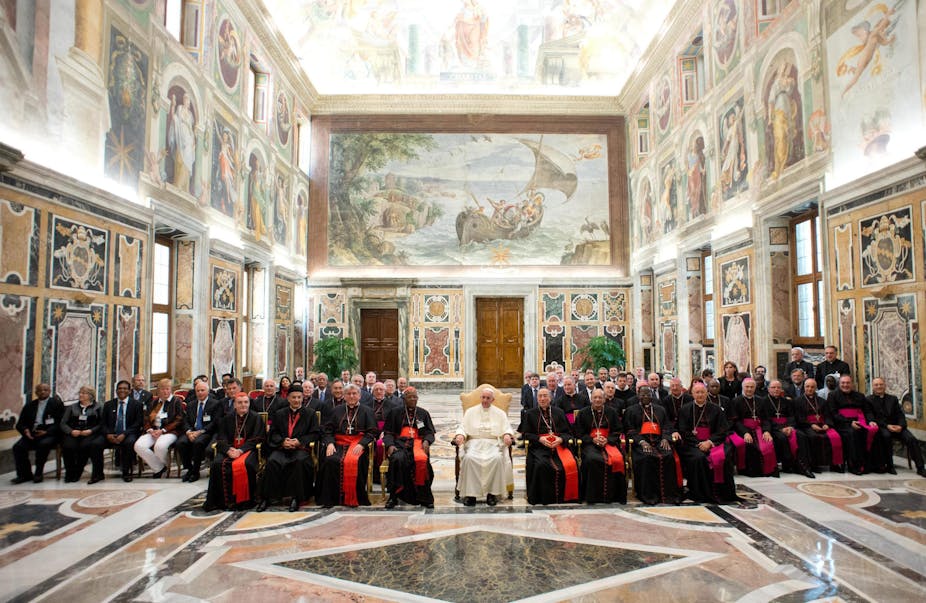Liberals are enthusiastic, while conservative Catholics express deepening dismay. The Pope must be giving interviews again.
Reactions to Francis’s sit-down with Antonio Spadaro, editor in chief of La Civiltà Cattolica, have focused on areas where the Pope seems most in tune with liberal sympathies. His comments about not judging homosexual people have been widely quoted, as has his explanation that he has deliberately avoided focusing on obsessive issues such as abortion, gay marriage and contraception.
Yet this long, thoughtful interview reveals a theological subtlety and a spiritual depth which cannot be communicated in selective sound bites. Not surprisingly for a Jesuit, Francis refers repeatedly to the Ignatian principle of “discernment”. He says, “The wisdom of discernment redeems the necessary ambiguity of life”.
He comes across as modest, a man of prayer, ready to admit to his own mistakes and ascetical in his personal life. He has a keen vision of the church as a healing presence amidst the suffering of the world, and he is willing to say where it has failed to live up to that calling. It is clear he puts human vulnerability and need before any abstract idea or moral absolute. He advocates uncertainty and doubt as a way of remaining open to God. Above all, he seeks to communicate the “simple, profound, radiant” message of the Gospel.
Style and substance
Theologically, Francis is in tune with the Second Vatican Council. Pope Benedict XVI sought to steer the church away from the historically and culturally contextualised theological model inspired by the Council, towards a more absolutist and transcendent view of the church’s role in culture and history. In words that resonate with the spirit of Vatican II, Francis describes the church as “the people of God on the journey through history, with joys and sorrows”. He goes on to say “all the faithful, considered as a whole, are infallible in matters of belief”. It is hard to imagine a more radical challenge to the creeping infallibility that has infected the papacy in recent decades. Such observations might not immediately catch the attention of the media, but they have far-reaching implications.
Still, a reality check is called for. Pope Francis has changed the style of the papacy almost beyond recognition, but he has yet to make any substantial changes to church structures. It remains to be seen what, if any, changes he might make to church teaching. He said, “we always need time to lay the foundations for real, effective change”. Liberals as well as conservatives would do well to learn from his example of patience and discernment.
It is unlikely he will make doctrinal changes around issues such as women’s ordination and same-sex marriage – although I would not be surprised if he changes the teaching on contraception. If he means what he says about the infallibility of the faithful, then he must surely recognise that the vast majority of Catholics have rejected Pope Paul VI’s prohibition on artificial birth control in the 1968 letter, Humanae Vitae. But pastoral sensitivity will not necessarily translate into doctrinal reform. In the interview he says, “The teaching of the church … is clear and I am a son of the church”.
An end to censorship?
I am however hopeful that he will show greater respect for the academic freedom of Catholic theologians than his predecessor. As Head of the Congregation for the Doctrine of the Faith and then as Pope Benedict XVI, Joseph Ratzinger suppressed debate on issues such as women’s ordination, contraception, homosexuality and abortion, and this created a theological culture of fear and self-censorship.
Francis says he wants to avoid the risk of such “institutions of censorship” in Rome, by delegating greater authority to local bishops. Theologians need freedom to analyse the church’s teachings in the context of changing circumstances, if they are to contribute to the process of discernment. This is particularly true of women theologians, who must be invited to participate if the Pope is serious in his desire “to develop a profound theology of the woman”. The section on women is the most disappointing part of the interview. He comes across as an old-fashioned romantic who fails to engage with the questions that women are asking of the church. He uses the term “the feminine genius” – a vacuous phrase favoured by John Paul II.
However, I dare to hope that, if Francis remains true to the vision he set out in this interview, Catholics can look forward to a greater degree of freedom, participation and dialogue than has been the case for many years. No wonder that for many in the church this feels like the arrival of spring after a long and difficult winter.

